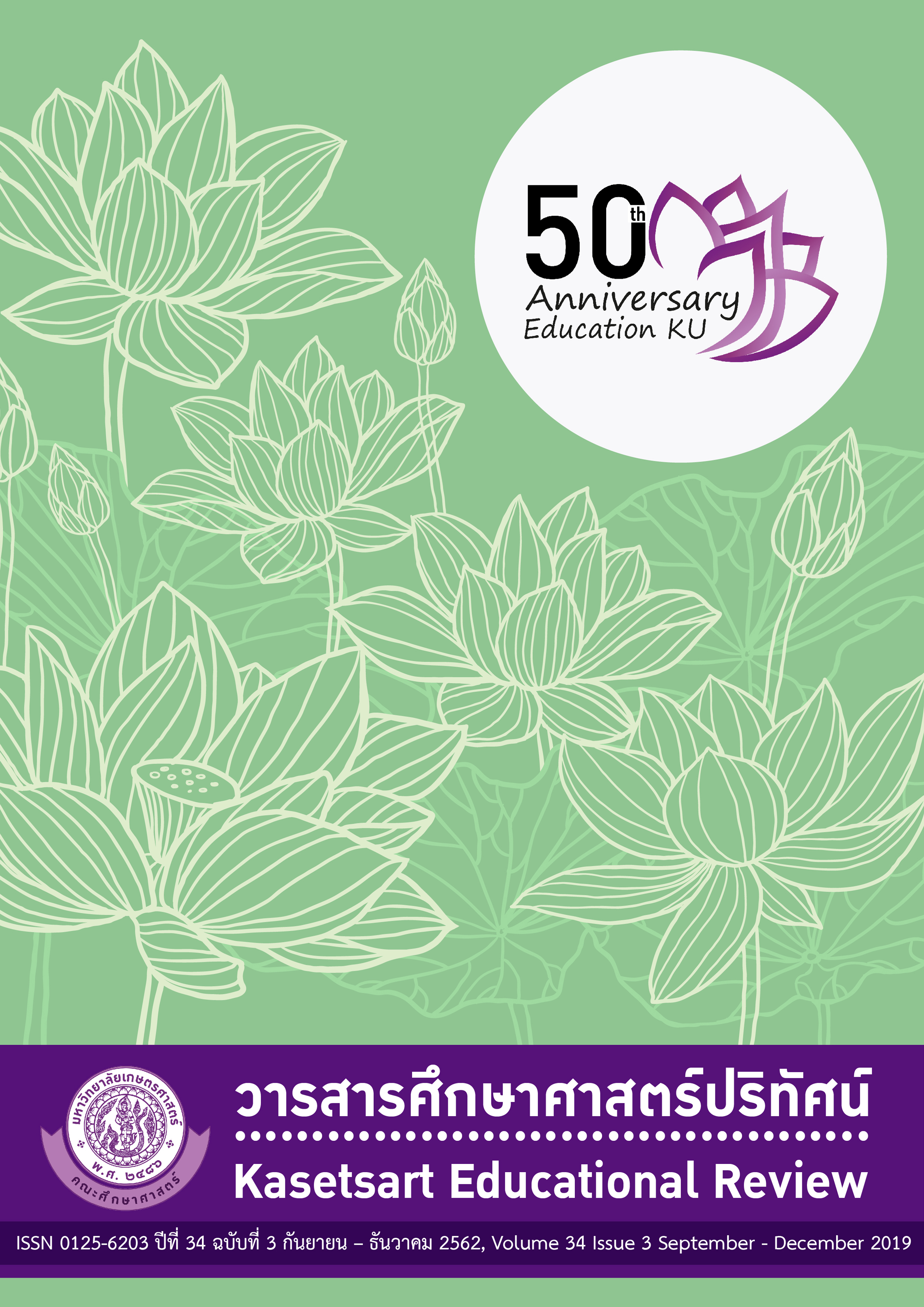ความฉลาดทางสังคมของเด็กวัยรุ่นตอนต้นในกรุงเทพมหานคร
คำสำคัญ:
ความฉลาดทางสังคม, เด็กวัยรุ่นตอนต้นบทคัดย่อ
บทความเรื่องความฉลาดทางสังคมของเด็กวัยรุ่นตอนต้นในกรุงเทพมหานคร เป็นผลของวัตถุประสงค์ข้อที่ 1 คือ เพื่อวิเคราะห์ความฉลาดทางสังคมของเด็กวัยรุ่นตอนต้น ซึ่งเป็นส่วนหนึ่งของวิทยานิพนธ์เรื่อง แนวทางส่งเสริมกระบวนการเรียนรู้ระหว่างครอบครัวและโรงเรียนในการพัฒนาความฉลาดทางสังคมของเด็กวัยรุ่นตอนต้นในกรุงเทพมหานคร กลุ่มตัวอย่างของงานวิจัยนี้ ได้แก่ นักเรียนชั้นประถมศึกษาปีที่ 5 และ 6 โรงเรียนในสังกัดสำนักการศึกษา กรุงเทพมหานคร จำนวน 347 คน ผู้ปกครองและครูประจำชั้นของนักเรียนดังกล่าว เครื่องมือที่ใช้ในการวิจัย ได้แก่ แบบประเมินความฉลาดทางสังคมของเด็กวัยรุ่นตอนต้น วิเคราะห์ข้อมูลเชิงปริมาณด้วยสถิติบรรยาย การวิเคราะห์ความแปรปรวน และการวิเคราะห์ความถดถอย ผลการวิจัยพบว่า 1) เด็กวัยรุ่นตอนต้นในกรุงเทพมหานครมีความฉลาดทางสังคมอยู่ในระดับปานกลาง 2) ผลการวิเคราะห์ปัจจัยที่ส่งผลต่อความฉลาดทางสังคม พบว่าตัวแปรอิสระที่ส่งผลต่อความฉลาดทางสังคมของเด็กวัยรุ่นตอนต้น คือ ระดับการศึกษาของผู้ปกครอง แต่ส่งผลเพียงร้อยละ 1.7 ส่วนสถานะภาพครอบครัว รายได้เฉลี่ยของผู้ปกครอง ไม่ส่งผลต่อความฉลาดทางสังคมของเด็กวัยรุ่นตอนต้นอย่างมีนัยสำคัญทางสถิติที่ระดับ 0.05
เอกสารอ้างอิง
Asher, S.R. & Coie, J.D. (1990). Peer rejection in childhood. Cambridge: Cambridge University Press.
Atchikul, Y. & Piasai, P. (2017). The Relationship Kalyanamitra and Forgiveness of Lower Secondary School Students in One of Schools in Bangkok. Kasetsart Educational Review, 32(3). [in Thai].
Boonprakob, W. (2001). Raising children with mental health. Journal of medical association of Thailand, 46 (January – March). [in Thai].
Department of Mental Health. (2003). Mental Health Care Guide for School Children for Parents (3rd ed.). Bangkok: Printing Business Veterans Organization Press. [in Thai].
Goleman, D. (2006). Social Intelligence: The New Science of Human Relationships. New York: Bantam Books.
Issaranuruk, S. (2006). Emotional and social development of children aged 6-12. Journal of public health and development, 4(2), 89-100. [in Thai].
Issaranuruk, S. & Suthisukon, P. (2007). Parenting. Journal of Public Health and Development, 5(1), 105-118. [in Thai].
Mahidol University, Institute for Population and Social Research. (2016). Thai Health 2016. Nakhon Pathom: Author. [in Thai].
Office of the National Economic and Social Development Board. (2016). National Economic and Social Development Plan Issue 12 (BE 2017-2021). Retrieved from http://www.nesdb.go.th/ewt_dl_link.php?nid=6422. [in Thai].
Siriwanbut, P. (2004). Theory of developmental psychology (2nd). Bangkok: Chulalongkorn University Press. [in Thai].
Srinuan, C. (2007). Emotional intelligence of grade six students in school under the jurisdiction of the office of the basic education commission in Bangkok metropolis. (Master’s thesis) Chulalongkorn University, Bangkok. [in Thai].
Suvetwethin, D. (2018, 4 January). Adolescence, last opportunity for EF development. Thai Health Promotion Foundation. Retrieved from https://www.thaihealth.or.th/ Content/40111. [in Thai].
Thai Rath Online. (2010, 5 January). Mental health problems, aggressive Thai children - Attention deficit hyperactivity disorder, (ADHD). Thai Rath. Retrieved from https://www.thairath.co.th/content/56969. [in Thai].
Thongsupsay, K. (2007). Development of a social intelligence scale for undergraduate students. (Master’s thesis) Chulalongkorn University, Bangkok. [in Thai].
WHO. (2004). Prevention of mental disorders: effective interventions and policy options Summary report. Geneva, World Health Organization.
Yamane, T. (1973). Statistic: An introduction Analysis. New York: Harper and Row.
ดาวน์โหลด
เผยแพร่แล้ว
ฉบับ
ประเภทบทความ
สัญญาอนุญาต
บทความทุกบทความเป็นลิขสิทธิ์ของวารสารคณะศึกษาศาสตร์ มหาวิทยาลัยเกษตรศาสตร์ วิทยาเขตบางเขน
วารสารศึกษาศาสตร์ปริทัศน์ (Kasetsart Educational Review)






